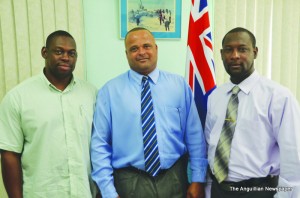
The Anguilla delegates to a fishing symposium in St. Barths told media representatives on Tuesday, May 21, they had reported to the conference that they were aware of illegal catching of fish in Anguilla’s waters and had in fact seen some of the boats in St. Barths involved in the practice.
It means that illegal fishing in Anguilla’s territorial waters, some 200 nautical miles to the north, is not only being done by deep-sea professional fishermen from places like Taiwan and Japan, but also by persons in the neighbouring islands.According to the Anguillian delegates, they were told that due to the closeness of the French and Dutch territories to the south, and the close proximity of other Eastern Caribbean islands, there was little space for separate territorial fishing in waters already fished out.
As a consequence, the St.Barths fishermen, who number about thirty persons, expressed an interest in fishing in Anguilla’s waters for pelagic fish such as tunas and wahoos and to be granted licences to do so. The Anguilla delegates, who understood their position, could not formally discuss the suggestion, stating that it was something they had to discuss with the island’s Government.
The delegates comprised the Hon. Jerome Roberts, Minister of Home Affairs with responsibility for Fisheries and Marine Resources, Mr. Samuel Webster, Adviser, who also attended in his capacity of fisherman; and Mr. James Gumbs, Director of Fisheries and Marine Resources.
“The symposium ran from May 12-14,” Mr. Roberts said. “The overall objective was to share fisheries and marine resource management, and fishing and surveying regulations. The symposium was also held to create linkages and collaborations within the fishing and marine industry in the Northern Leeward Islands. Participating islands were Guadeloupe, Antigua and Barbuda, St. Kitts-Nevis, Statia, Saba, St. Barths and Anguilla. Apart from directors of various fishing departments, there were also fishers who were at the symposium and this was good to capture the views of everybody.”
Mr. Roberts listed some of the points which came out of the symposium. They included the need to address fish stocks in the various islands – taking into consideration over-fishing in some areas – and to see how the territories could agree to work together for the betterment of the industry and the environment.
“Although the symposium was arranged by the Natural Reserves of St. Barths, the overall objective, as I said, was to create those linkages and collaborations between the islands,” he stressed. “Because we are so small and just a few miles away in some instances, we wanted to create that relationship…in terms of having some on-the-ground person or personnel with whom we could work in relation to the whole question of fishing. There were also discussions on creating policies among the islands [with respect to territorial boundaries].”
Roberts reported that there were complaints by St. Barths that stocks of lobster and conch were almost depleted in that island’s waters. One of the scientists at the symposium suggested that there should be a closed season in St. Barths and other islands so that those stocks could be rebuilt over a period of breeding time.
The Minister said reference was made to the need to monitor illegal fishing in territorial waters. He pointed out that in the case of Anguilla, due to the unavailability of resources, it was not possible to properly do so and that this was a matter of concern.
Mr. Samuel Webster said he had seen a number of boats in St. Barths which were constantly crossing his area of fishing in Anguilla’s waters to the north. According to him, it was known that St. Barths’ fishermen were placing Fishing Aggregating Devices (FADS) in about four thousand metres of water to catch pelagic fish.“These attract the small fish andthen the large ones such as dolphins and tuna would follow,” he stated. “They have agreed to give us the coordinates of those FADS so that our fishermen can make some money by going to the FADS as well.”
Mr. James Gumbs said the St. Barths fishermen, especially, wanted to meet with the Anguilla delegates not only to discuss fishing in Anguilla’s waters, but alsothe sharedshallow fishing bank around Anguilla, St. Martin/St. Maarten and St Barths where there are stocks of lobster and conch and the need for replenishment.
Responding to a question about the St. Barths fishermen, Mr.Gumbs said they would be willing to pay for a licence to fish in Anguilla’s waters. “Under the Law of the Sea, if a country is not utilising all of its fisheries resources, it can be required to allow others to come in and fish, but under agreements instituted by that country,” he explained. “That does not give the foreign fishers the right to fish in our waters. The problem that we face is that we do not have the means to control it and it is a decision that we will have to make as to whether or not we are going to try to regulate those persons who are fishing illegally. We can do so – as was done inthe past – by offering them theright to fish in our waters legally, but under a licence and certain other conditions.”
Whether the desire of the St. Barths fishermen to fish in Anguilla’s waters under a licence will be granted, is a matter to be determined by the Government.
It was agreed among all the delegates, at the symposium, to meet again within six months for further overall discussions on the fisheries and marine resources in the Northern Leeward Islands.








